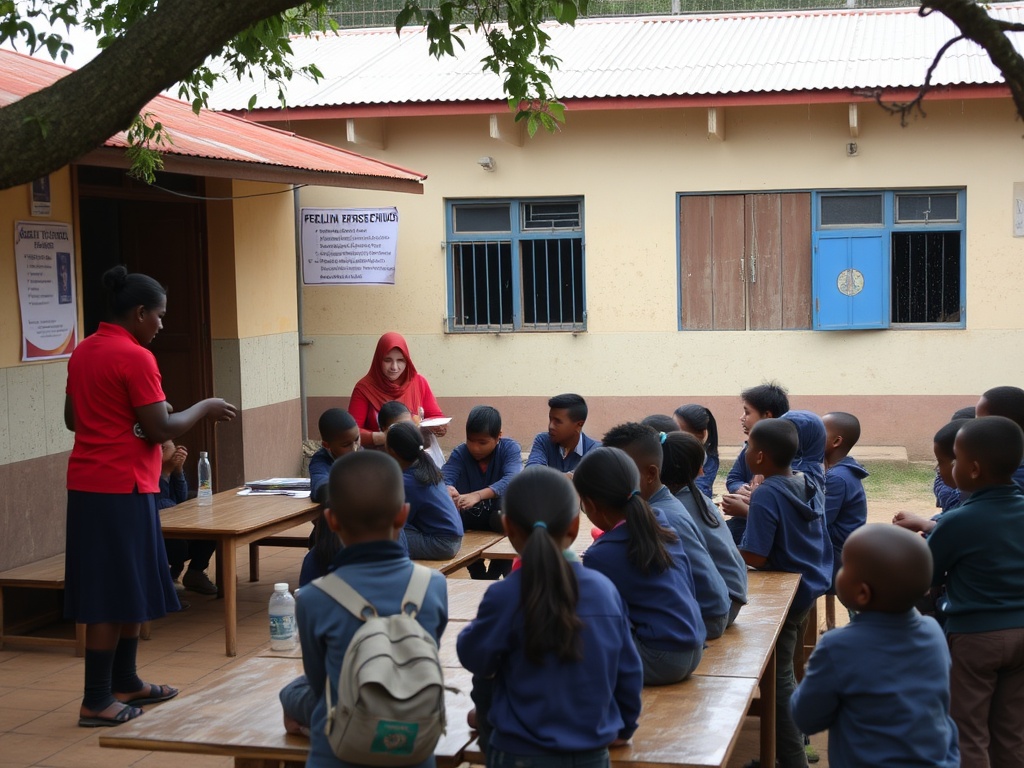Concerns Over Labour’s Breakfast Club Policy
The ambitious breakfast club initiative proposed by Labour is facing significant challenges, as schools report that the funding provided amounts to a mere 60p per pupil. Lindsey MacDonald, the CEO of the children’s charity Magic Breakfast, expressed to The i Paper that the Government’s funding is “many, many millions away” from the necessary budget to effectively implement universal breakfast clubs, which typically require all children to gather in one hall or building before the school day begins. This model is the most costly due to the staffing requirements involved.
Education Secretary Bridget Phillipson’s election commitment to establish free breakfast clubs in every primary school across England is set to commence with a pilot program involving 750 schools starting in April, referred to as “early adopters.” However, Schools Week reported recently that several headteachers have opted out of the pilot, while others are preparing to operate at a financial loss due to the insufficient funding rate.
Simon Kidwell, the principal of Hartford Manor Primary School in Cheshire, has projected that the scheme could result in a deficit of up to £4,000. He stated that he would either need to increase staffing ratios or cut food expenditure in order to “break even.” He mentioned, “Our school is proud to be part of the trial; however, the costs of staffing and running the scheme appear marginal at best. It is crucial that we get an accurate assessment of the funding required before expanding the initiative nationwide.”
Similarly, Paul Bertram, headteacher at Buxworth Primary School in Derbyshire, reported having to withdraw from the scheme after facing a £9,000 shortfall. His school currently charges £2.75 for its existing hour-long breakfast club, which serves an average of 30 pupils and is staffed by a sports teacher present on-site.
Understanding Labour’s Breakfast Clubs Initiative

Labour’s election manifesto pledged to “break down the barriers to opportunity” by establishing a free breakfast club in every state school catering to primary-aged children in England. This universal breakfast club policy aims to provide children with a supportive start to their day while addressing the challenges posed by child poverty, ultimately enhancing “behavior, attendance, and academic attainment.”
The first stage of this policy involves collaborating with 750 early adopter schools from 2025 to 2026 to “test and learn how best to implement the new breakfast clubs ahead of a national rollout,” as stated by the Department for Education (DfE). These early adopter schools are anticipated to launch their breakfast clubs for students in April, with government funding aimed at covering food, delivery, and staffing expenses.
Subsequently, the Children’s Wellbeing and Schools Bill will impose a duty on all state-funded primary schools to “secure a free breakfast club, subject to the will of Parliament,” according to the DfE. This initiative represents another setback for Phillipson, who is reportedly facing scrutiny regarding her management of Ofsted reforms and VAT on private school fees, which may place her position at risk during Sir Keir Starmer’s upcoming Cabinet reshuffle.
Moreover, Chancellor Rachel Reeves is contemplating additional spending reductions in major departments as the fiscal outlook grows increasingly bleak, characterized by stagnant growth and unexpectedly high interest rates. While the Government has allocated £315 million for the full rollout, impact assessment documents for the Children’s Wellbeing and Schools Bill indicate that the exact costs are still being “finalized and agreed.” The document further stresses that “the costs will then fall to schools.”
Schools will receive an initial allocation of £500 to cover setup expenses and a lump sum of £1,099 for “fixed-admin and start-up staffing costs” for the summer term. The reimbursement amount for schools will depend on the number of pupils utilizing the breakfast club. Currently, the basic funding rate is just 60p per pupil per day, with an additional 78p per pupil allocated based on the proportion of free school meal recipients at the school. For special schools, the per pupil payments are higher, totaling £3.23.
Challenges in Implementation and Funding
Ms. MacDonald from Magic Breakfast pointed out that the current government funding is far from sufficient to enable primary schools to provide traditional breakfast clubs, which require students to gather in a single location before the school day. This model is the most costly due to the necessity of additional staffing beyond regular school hours. She noted that a more economical “mixed model” approach could be implemented, allowing schools to offer food in various “grab and go” settings, such as when students arrive or within classrooms.
However, Ms. MacDonald emphasized that it remains unclear in the DfE guidance whether schools can adopt alternative models, which has led several institutions to withdraw from the early adopter scheme. She commented, “We don’t yet have clarity on whether the Government is going to allow that flexibility for schools to adapt beyond traditional breakfast clubs.” She added, “If it’s expected that 100 percent of students can access a traditional breakfast club model with the appropriate staffing, then the Government is many, many millions away from the budget that we would expect due to the staffing levels required.”
Ms. MacDonald also highlighted that schools are “concerned” about the staffing ratios. Allowing for mixed-model approaches could potentially “reduce the costs and pressures on staffing while ensuring that the provision can be operationalized for all students.” She urged the Government to provide clearer guidance regarding the flexibility and choices available to schools in terms of the models they can adopt and to ensure that the advice offered helps schools maximize their budgets.
A spokesperson for the Department for Education stated, “Through our Plan for Change, we are taking action to dismantle the unfair link between background and success, supported by our plan to roll out free breakfast clubs in every primary school. At the Budget, despite having to make difficult decisions, we protected key education priorities by tripling our investment in breakfast clubs, enabling us to fund food, delivery, and staffing costs for 750 early adopter schools starting in April 2025. We will announce the details of the 750 early adopter schools in due course and are working closely with the applicants. This test-and-learn phase will help us determine how best to support schools for a national rollout, as we strive to enhance career opportunities for parents and improve life chances for children.”




